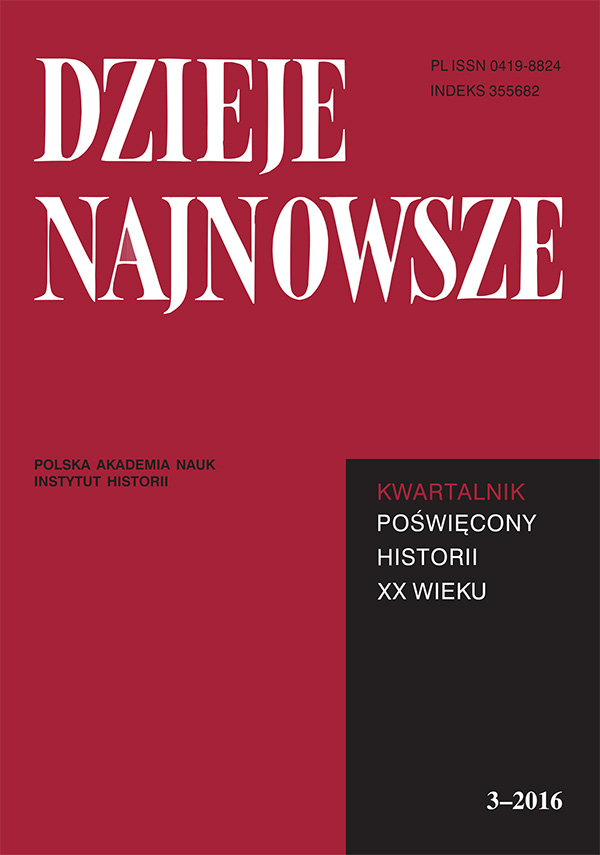Federalizacja czy rozpad? Stosunki Stanów Zjednoczonych i Austro–Węgier w ostatnim roku pierwszej wojny światowej
Federalization or Dissolution? The Relations of the USA and Austria–Hungary in the Last Year of the First World War
Author(s): Václav HorcčičkaSubject(s): History, Diplomatic history, Political history, Recent History (1900 till today), Pre-WW I & WW I (1900 -1919)
Published by: Instytut Historii im. Tadeusza Manteuffla Polskiej Akademii Nauk
Keywords: First World War; Austria-Hungary; United States; the collapse of the Austro-Hungarian monarchy;
Summary/Abstract: The United States of America played an undeniably pivotal role during the dissolution of Austria–Hungary. This article demonstrates the fact that President Wodrow Wilson was, until the last months of the war, hesitant to support the dissolution of Austria–Hungary. He gradually changed his standpoint over the spring and summer of 1918. It also proves that the Secretary of State Robert Lansing had a major effect on the President’s decision making. In contrast, the secret Peace Inquiry Bureau, or the group of experts named The Inquiry, established by Colonel House with the aim of tackling the issues of peace settlement, lacked inner coherence in terms of the future of Austria–Hungary after the war. The group’s representatives were long in favor of federalization, rather than of the empire’s dissolution. The article also largely examines Austro–Hungarian policy toward the USA, which to this day has not been thoroughly studied in specialized literature. Yet, before the spring of 1918 and to a certain extent even later, Vienna regarded the USA as a possible partner in its efforts to conclude peace. Studying Austro–Hungarian sources, the article analyzes in detail the development of Austro–Hungarian policy, which lacked a unified theme. In this respect, the article also mentions the devastating effect of the Sixtus Affair (April 1918) on the reputation of Austria– Hungary in the USA. Another conclusion of this article is the findings that in Austria–Hungary in the spring and summer of 1918, surprisingly scarce attention was paid to the US policy vis–à– vis Central Europe. President Wilson had not envisaged dissolution of the Hapsburg monarchy at the end of the war. In spite of his one statement from December 1914, the dissolution of Austria–Hungary was not in his plans. After Emperor Charles came to the throne (November 1916), Wilson and Lansing struggled to drive a wedge among the Central Powers and therefore carefully distinguished among them. While Lansing could not rule out the possibility that Austria–Hungary would escape the influence of Germany and would withdraw from the war, as time proceeded, he grew increasingly skeptical. His reservation was based on the widely accepted opinion that the monarchy was Germany’s vassal. As this article proofs, Austria–Hungary was not utterly dependent on Germany, contrary to statements made by various US officials including Wilson, the Emperor’s reputation was damaged by the Sixtus Affair in the spring of 1918. Similarly, with regard to the dangerous German offensive, a growing number of voices in the US administration called for the support of the claims of the exile representatives of the monarchy’s nations. Gradually, the space for differentiating between Austria–Hungary and Germany vanished. The United States had become convinced of the monarchy’s total dependence on Berlin and resolved for its dissolution.
Journal: Dzieje Najnowsze
- Issue Year: 48/2016
- Issue No: 3
- Page Range: 51-85
- Page Count: 35
- Language: Polish

